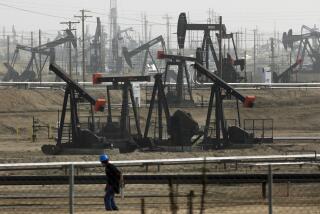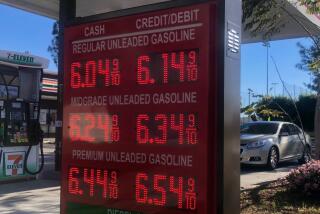OIL : Several Firms to Boost Their Spending in 1991
CHICAGO — Several major oil company executives said Monday that they will boost 1991 spending, a move that is in keeping with recent industry trends and is not influenced by the Middle East crisis.
The executives, in interviews at the annual meeting of the American Petroleum Institute, said they are basing their plans for modest increases in spending next year on expectations that oil prices will stabilize in the low $20s-per-barrel range once the crisis is resolved.
Such prices would be higher than before Iraq invaded Kuwait, but lower than they are now.
On Monday, crude oil for December delivery closed down $2.02 a barrel at $31.87 in trading on the New York Mercantile Exchange.
Although increased oil revenues have prompted some companies--including Unocal Corp. and Chevron Corp.--to speed up drilling plans, executives said their long-range strategies remained unaffected by the crisis, which has driven prices as high as $40 in recent months.
“This is a long-term business, and you don’t turn the money on because the oil price spikes,” said Lawrence G. Rawl, chairman of Exxon Corp.
Although spending plans vary from company to company, many of the executives said they would boost spending on exploration and production of oil, particularly overseas. In refining and marketing, there is a complicating factor as oil companies prepare their 1991 budgets: the unknown costs of retrofitting refineries to meet requirements of the proposed federal clean air act.
Rawl said Exxon, the nation’s largest oil company, would probably spend a little more than the $8.3 billion it expects to spend in 1990.
Exxon plans few changes in its current allocations, with about 20% to 25% of the budget going to refining and marketing, 10% to chemicals and the rest to exploration and production. About 65% of Exxon’s exploration and production budget is spent overseas, the rest in the United States.
As for the effects that the clean air act might have on spending, he said Exxon had not placed a figure on it--”but it’s going to cost a lot.”
No. 2 Mobil Corp. will spend more than $6 billion in 1990, considerably higher than before, said Chairman Allen E. Murray, who also is API’s board chairman.
“We have a very aggressive budget that we adopted for the year 1990, one of the highest we’ve ever had, because we think things look good for the oil industry, and the basics seem to be coming back into line,” Murray said.
But for next year, he added, “if you’re asking me if I’m suddenly going to set our exploration people loose assuming (that the price of oil is $40 a barrel), the answer is we are not.”
Texaco Inc. plans to spend about $3.1 billion in 1991, an increase over 1990’s estimated $2.9 billion and 1989’s $2.3 billion, said James W. Kinnear, president and chief executive. About two-thirds of that will go to exploration and production, he said. Texaco will spend another $600 million through affiliated companies, he added.
Chevron Corp.’s 1990 capital spending will come in at $4 billion. Next year, “it will be up a not-insignificant amount,” said Chairman Kenneth T. Derr.
Much of the exploration and production money will go overseas, he said.
He estimated that the company also must spend more than $500 million in the next five years just to meet initial requirements of the clean air act, though he declined to guess total costs.
British Petroleum will increase capital expenditures “something more than inflation” from current levels of about $6.5 billion worldwide, said James Ross, president of subsidiary BP America Inc.
Ross expects spending in the United States, which is more than $2 billion a year, to go up slightly next year.
At Los Angeles-based Atlantic Richfield Co., “we’re going to be drilling more wells next year, so our spending will be up some,” said Chairman Lodwrick M. Cook.
He estimated that spending would increase to around $3.5 billion, with expenditures heavily weighted to Arco’s U.S. operations in Alaska and the lower 48 states.
Unocal Corp. will boost capital spending more than $1.1 billion above 1990’s, said Chairman Richard J. Stegemeier, who noted: “We have chosen to accelerate our drilling program this year . . . that would have been in next year’s budget.”
CRUDE PRICES Daily close, December contract, light, sweet crude oil, price per 42-gallon barrel. Monday; $31.87, down $2.02
More to Read
Inside the business of entertainment
The Wide Shot brings you news, analysis and insights on everything from streaming wars to production — and what it all means for the future.
You may occasionally receive promotional content from the Los Angeles Times.










